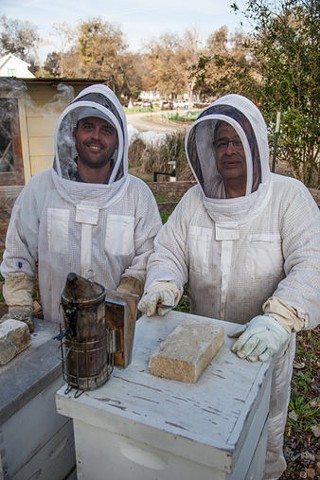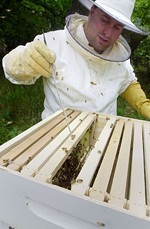How Sweet It Is
Austin Honey Company to host beekeeping workshop at Springdale Farm
By Anna Toon, 10:00AM, Fri. Feb. 14, 2014
Raul Vergara and Mark Bradley are serious about bees.
Specializing in raw, unheated, and unfiltered honey, the father and son-in-law duo known as Austin Honey Company will be hosting a special beekeeping workshop at Springdale Farm next Tuesday to share the wonders of the honeybee, from all the tools and equipment used in beekeeping to a peek at the inner workings through an observation hive. We caught up with the pair, eager to learn more about the tiny, magical creatures.
Austin Chronicle: How important are bees to local food production?
Austin Honey Co.: Our bees and us are on an organic food mission within a 30 mile radius of downtown Austin. Although we are blessed in Austin to live in a place that reveres and protects our wild places and spaces, and we are surrounded by active civically minded individuals who care about what they do to their landscapes and homes and what kinds of chemicals they use, we still need bees on our local organic urban farms. Our climate, being inconsistent in terms of rainfall, leads to swings in the populations of our wild pollinators. The presence of an abundance of managed colonies of honeybees on local organic farms helps to ensure as much complete pollination as possible leading to higher yields, despite the variances of rainfall. These higher yields allows these farms to economically compete more so with the overall industrial agriculture system that we are fighting against. The farms that host our bees have seen an increase in their yields and are doing well. We are proud to partner with them. Some of the more well known farms that host some of our bees are Green Gate Farms and Springdale Farm in East Austin.AC: What do you hope to offer the public through this workshop?
AHC: We hope to educate the public about bees, beekeeping, and the guts of our operation by providing them with a glimpse of the life cycle of the honeybee, what we do and our operation, and see live honeybees through an observation hive. We also want to help people understand more about the challenges that the honeybee faces and what kinds of behavioral choices we can make that will allow them to thrive in the wild.AC: We hear a lot in the news about the plight of the bees as well as colony collapse, should we be scared?
AHC: Yes, we should be scared and worried. The majority of all the delicious things we love to eat are pollinated by managed colonies of honeybees and wild pollinators such as bumblebees, wild bees, moths, bats, wasps, flies, etc. The Achilles heel of our industrial agriculture system relies solely on the back of the managed honeybee. We would have no almonds, and few of the fruits we love such as apples, plums, peaches, all berries, apricots, avocado, etc. One only has to go our own USDA's website to determine the full extent of the direct economic effects of managed colonies of honeybees that are trucked around our nation to create the diversity of our food system that we encounter with each visit to the grocery store. Locally, we do not face issues with CCD, or colony collapse disorder. By purposely placing our beehives on local organic farms, they do not come in direct contact with contaminated plant material, harmful chemicals, etc. They are thriving and the results speak for themselves. The loss of the honeybee and other pollinators would leave us with a gruel diet of corn, wheat, rice and other wind pollinated staple crops. We would lose the diversity and delicious abundance that we enjoy now. Although we may survive, life would be bland, boring, and tasteless.AC: What makes each batch of honey unique?
AHC: We strive to harvest our honey seasonally and each season and honey crop provides a uniquely tasting honey. The diversity of what they are growing on the farms (produce, herbs, cut flowers, fruit trees) coupled with all the wildflowers, weeds, flowering trees, etc.in the wild lands growing around the farms creates a uniquely tasting honey for the people of the Austin area. The intensity and duration of rainfall will change the color and taste of the honey from season to season and year to year. Typically, lighter honeys are spring honey and the honey grows darker and bolder as the seasons progress culminating in a dark molasses like fall honey with a bold and herbal taste. As we are all aware of, rainfall is inconsistent and unpredictable around here, and so are each seasons honey harvests. We do everything we can do to ensure we have healthy strong colonies of honeybees to pollinate what needs it on the farms, and the result of these pollinating visits is a sweet reward that we may all enjoy.AC: Why are you so passionate about bees?
AHC: Bees are the canary in the coal mine so to speak. They are the ringing bell communicating to us that our world and our industrial agricultural model is killing us, our environment and our complete and diverse ecological systems. We feel this intense urging within us that is compelling us to action. Through our local efforts, we are slowly breaking down the erosive cycle of our broken food system. Left in its wake is a food system grown, shared, prepared, and enjoyed by its local citizens. This is an example of a real economy in action, the foundational and continual agrarian cycle envisioned by our nation's founding fathers. A sustainable and renewable landscape that exists with perpetuity for all future generations to enjoy in abundance.AC: What is the single coolest thing about the little guys?
AHC: Bees are superheroes, and to prove it one thing that is amazing is that they can sense the electric fields of flowers. They do this to determine which blossoms have already been raided of their sweet nectar and which ones still have some remaining. Did you even know that flowers have electric fields?!Beekeeping Workshop. Tue., Feb. 18, 6pm-8:30pm. Springdale Farm, 755 Springdale. $10. wwww.austinhoneyco.com.
Can’t make it to the workshop? You can catch Austin Honey Co. at Hope Farmers Market every Sunday in addition to their Saturday spots at the SFC’s Downtown and Sunset Valley markets as well as the Cedar Park Market at Lakeline Mall and Wednesday’s market in Dripping Springs.
A note to readers: Bold and uncensored, The Austin Chronicle has been Austin’s independent news source for over 40 years, expressing the community’s political and environmental concerns and supporting its active cultural scene. Now more than ever, we need your support to continue supplying Austin with independent, free press. If real news is important to you, please consider making a donation of $5, $10 or whatever you can afford, to help keep our journalism on stands.
beekeeping, Austin Honey Company, Springdale Farm, Raul Vergara, Mark Bradley










